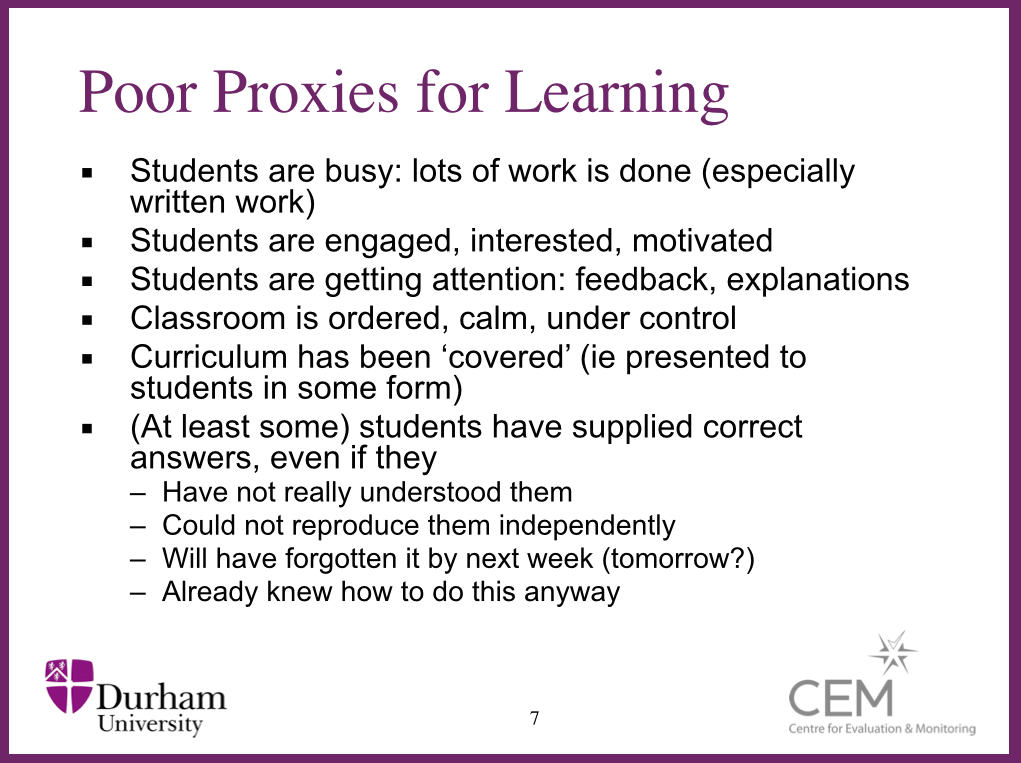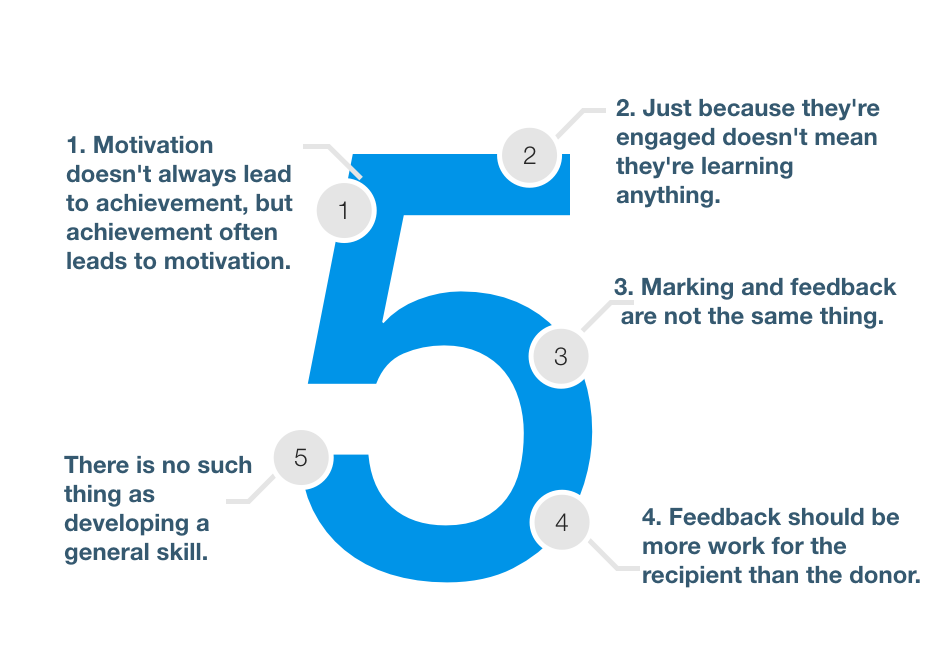Five Things I Wish I Knew When I Started Teaching

1. Motivation doesn’t always lead to achievement, but achievement often leads to motivation.
While there is a strong correlation between self perception and achievement and we tend to think of it in that order, the actual effect of achievement on self perception is stronger than the other way round (Guay, Marsh and Boivin, 2003.) It may well be the case that using time and resources to improve student academic achievement directly may well be a better agent of psychological change than psychological interventions themselves. Daniel Muijs and David Reynolds (2011) note that:
At the end of the day, the research reviewed shows that the effect of achievement on self-concept is stronger that the effect of self-concept on achievement.
Despite this, a lot of interventions in education seem to have the causal arrow pointed the wrong way round. Motivational posters and talks are often a waste of time and may well give students a deluded notion of what success actually means. In my experience, teaching students how to write an effective introduction to an essay through close instruction, careful scaffolding and then praising their effort in getting there is a far more effective way of improving confidence than showing them a TED talk about how unique they are.
2. Just because they’re engaged doesn’t mean they’re learning anything.
One of the slides from a talk that has stuck with me the most in recent years was this one from Professor Rob Coe which in which he criticised graded lesson observations and highlighted several performance indicators for learning which are actually very misleading:

This again is quite a counterintuitive claim. Why is engagement is such a poor proxy indicator – surely the busier they are, the more they are learning? This paradox is explored by Graham Nuthall in his book ‘The Hidden Lives of Learners,’ (2007) in which he writes:
“Our research shows that students can be busiest and most involved with material they already know. In most of the classrooms we have studied, each student already knows about 40-50% of what the teacher is teaching.” p.24
Nuthall’s work shows that students are far more likely to get stuck into tasks they’re comfortable with and already know how to do as opposed to the more uncomfortable enterprise of grappling with uncertainty and indeterminate tasks.
3. Marking and feedback are not the same thing.
This subtle difference may seem semantic but there is an important distinction to be made. The value in marking a piece of work may counterintuitively be of more benefit to the teacher than the student as David Didau explains:
While there’s no doubt that marking and feedback are connected, they are not the same. In some parts of the world – Japan for instance – teachers do very little marking but that’s not to say students are not getting feedback. From my own experience, I’m pretty sure it’s possible to make marks in students’ books without providing anything in the way of useful feedback and of course lots of thinking (some of it disastrous) has been done to try to prevent this from happening. Ask any group of teachers if their marking load has increased dramatically in past five years and they’ll fall over themselves to let you know just how much impact marking has on their lives, but what impact does it have on students’ outcomes? The answer is, we just don’t know.
4. Feedback should be more work for the recipient than the donor.
Possibly the most damaging misappropriation of research in my career has been the mangling of Assessment For Learning – a quagmire from which we are now only beginning to emerge. Not long after Dylan Wiliam’s seminal 1998 ‘Inside the Black Box’ became adopted at a national level, school leaders and policy makers managed to twist it into a pale imitation of its original form as AFL became about students memorising what level they were working at and teachers marking books at a level that defied sense in order to show ‘evidence’ of learning. But for feedback to be truly meaningful to students, they need to take ownership of it which may well mean not giving levels to a piece of work at all and instead just leaving comments for the student to reflect and act upon. As Dylan Wiliam writes:
Robyn Renee Jackson suggests that one of the most important principles for teachers is “Never work harder than your students” (Jackson, 2009). I regularly ask teachers whether they believe their students spend as long processing feedback as it takes for the teacher to provide it. Few teachers say yes. We spend far too much time giving feedback that’s either completely ignored or given scant attention.
5. (a) The steps needed to achieve a skill may look very different to the final skill itself.
If you want to get good at a certain skill then surely the best way to get good at it is to practice that particular skill right? Well not according to the tenets of deliberate practice which asserts a more indirect approach that breaks a global skill down into its constituent local parts and focuses on specific feedback and incremental improvement rather than a set of assessment criteria/performance descriptors that are “aimed at some vague overall improvement.” (Ericsson) In her book ‘Making Good Progress’, Daisy Christodoulou writes:
Whilst skills such as literacy, numeracy, problem solving and critical thinking are still the end point of education, this does not mean that pupils always need to be practising such skills in their final format. Instead, the role of the teacher and indeed, the various parts of the education system, should be to break down such skills into their component parts, and to teach those instead. This means that lessons may look very different from the final skill they are hoping to instil. For example, a lesson which aims to teach pupils reading may involve pupils learning letter-sound correspondences. A lesson with the ultimate aim of teaching pupils to solve maths problems may involve them memorising their times tables. The idea here is that the best way to develop skills does not always look like the skill itself.
5. (b). There is no such thing as developing a ‘general’ skill.
Of course, critical thinking is an essential part of any student’s mental equipment. However, it cannot be detached from context. Teaching students generic ‘thinking skills’ separate from the rest of the curriculum is often meaningless and ineffective. As Daniel Willingham puts it:
[I]f you remind a student to ‘look at an issue from multiple perspectives’ often enough, he will learn that he ought to do so, but if he doesn’t know much about an issue, he can’t think about it from multiple perspectives … critical thinking (as well as scientific thinking and other domain-based thinking) is not a skill. There is not a set of critical thinking skills that can be acquired and deployed regardless of context.
This detachment of cognitive ideals from contextual knowledge is not confined to the learning of critical thinking. Some schools laud themselves for placing ‘21st-century learning skills’ at the heart of their mission but without anchoring them in domain specific contexts, they are often a waste of time. Anders Ericsson develops this point:
This explains a crucial fact about expert performance in general: there is no such thing as developing a general skill. You don’t train your memory; you train your memory for strings of digits or for collections of words or people’s faces. You don’t train to become an athlete; you train to become a gymnast or sprinter or a marathoner or a swimmer or a basketball player. You don’t train to become a doctor; you train to become a diagnostician or a pathologist or a neurosurgeon.
I’ve written more about this here and this by Dan Willingham is probably the definitive piece on critical thinking.

Leave a comment